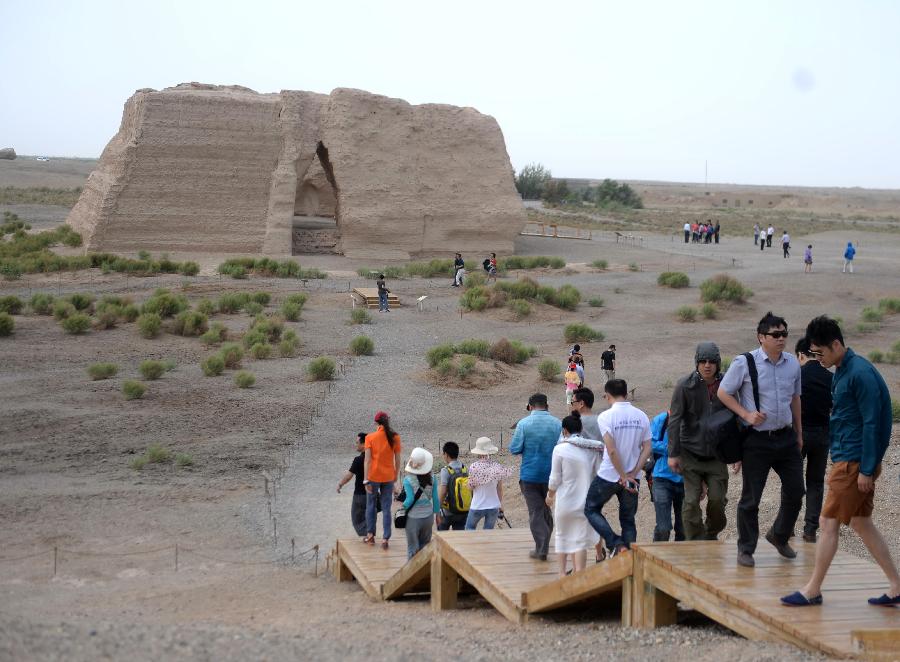
. > TOP STORIES
Literary geography signals quest for literary roots
Author : Zhu Yi, Huang Shan Source : Chinese Social Sciences Today 2014-09-29

Tourists admire the scenery around Yumen Pass west of Dunhuang in Northwest China’s Gansu Province. In ancient times, the pass was a key landmark on the Silk Road connecting Central Asia and China. Due to its special location, it inspired many ancient poems and earned a revered place in the annals of literary geography. (Photo/Chinanews.com)
As an emerging interdisciplinary subject, literary geography combines both literary and geographical studies, putting study of literary space at its core. The discipline has continuously attracted attention in Chinese academic circles by virtue of its theoretical and practical charm over recent years. In 2011, Chinese experts proposed classifying literary geography as an independent discipline at the first annual meeting of the Chinese Literary Geography Association.
The concept of literary geography was pioneered by Chinese scholar Liang Qichao (1873-1929), but didn’t gain widespread attention until the 21st century.
“Studies of ancient Chinese literature and Chinese literary criticism traditionally focus on the relationship between literature and regions,” said Zeng Daxing, director of the Chinese Literary Geography Association and professor at the Faculty of Chinese Language and Literature at Guangzhou University, adding that guofeng (collection of folk songs) within The Book of Songs was the earliest practice of literary geography. Evaluation of guofeng within The Commentary of Zuo was the primary analysis of literary geography.
Since the 1980s, literary geography in China has entered a high development period. According to statistics from the Chinese Literary Geography Association, there have been more than 1,000 essays and 200 academic works successively published since the 1980s. In addition, research teams have grown to include not only scholars of ancient Chinese literature but also scholars of contemporary Chinese literature, foreign literature, comparative literature and folk literature.
Yang Yi, a member of the Chinese Academy of Social Sciences, claimed that studies of literary geography over the past three decades have provided new vision and methods for literature studies. This has allowed deeper analysis of literary works from the perspectives of time and space, while also promoting development of human and historical geography.
“People have been accustomed to analyzing historical works from the perspective of time, ignoring the issue of space,” said Ge Yonghai, professor at the College of Humanities at Zhejiang Normal University, adding that the issue of space should be seriously considered if exploring a period of history.
Mei Xinlin, professor at Zhejiang University of Technology, said that literary geography is developing mainly due to its special research subject of space within literature.
The fundamental task of literary geography is to systematically link the interactive relationship between the geographical environment and literary elements, thus finding out their internal relations and characteristics as well as giving reasonable interpretations. Yang said that the main characteristics of literary geography involve seeking the root of literature and creating a wider dialogue between folk materials and written references.
Another research direction of literary geography is literary landscape, which refers to the landscape closely related to literature. Gao Renxiong, a professor at the School of Literature at Northwest University for Nationalities in Lanzhou, Gansu Province, said that studies of literary landscape provide new theoretical support for research on tourism culture. At the same time, Gao said these studies also promote protection and utilization of natural and human landscape.
Studying Chinese literature from a regional perspective meets the requirement of the discipline. Yang claimed that literary geography provides a significant vision and method of literature studies, embracing the issue of space to expand the width and depth of creation of contemporary literature.
As an interdisciplinary subject, literary geography is still at the stage of discipline construction. Tao Litian, professor at the School of Literature at Capital Normal University in Beijing, claimed that it is imperative to develop certain topics from the perspectives of literature and geography, and conduct efficient and effective research to provide theoretical support for discipline construction.
Mei claimed that there are five main points worthy of consideration in constructing a complete disciplinary system. First, literary geography is an interdisciplinary research related to literature and geography. Second, it is an organic combination of literature and geography. Third, it places more attention on literature studies than geographical studies. Fourth, it holds spatial form of literature at its core. Fifth, it is not only a research method but could also develop into an emerging interdisciplinary subject.
Zeng said that the construction of literary geography demands top-level design based on scientific parameters. It is necessary to comprehensively understand the dual influence of local and external culture on literature as well as the relationship between regionalism, epochal character and universality of literature, avoiding penetration of utilitarianism and action of dividing regional literature.
The Chinese version appeared in Chinese Social Sciences Today, No. 645, September 12, 2014.
The Chinese link: http://sscp.cssn.cn/xkpd/xszx/gn/201409/t20140912_1324807.html
Translated by Chen Meina
Revised by Tom Fearon
Ye Shengtao made Chinese fairy tales from a wilderness
Ye Shengtao (1894–1988) created the first collection of fairy tales in the history of Chinese children’s literature...
-
How northern ethnicities integrated into Chinese nation
2023-09-18
-
Mogao caves
2023-09-12
-
Mogao Grottoes as ‘a place of pilgrimage’
2023-09-12
-
Time-honored architectural traditions in China
2023-08-29
-
Disentangling the civilizational evolution of China
2023-08-28
-
AI ethics in science fiction
2023-08-23













 2011-2013 by www.cssn.cn. All Rights Reserved
2011-2013 by www.cssn.cn. All Rights Reserved